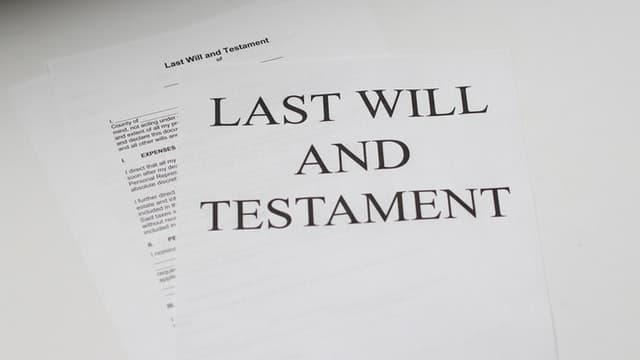
What is a Will Codicil?
This article has been reviewed by a practicing attorney in 2020
This content is not intended to be a substitute for professional legal advice. Always seek the advice of an attorney or another qualified legal professional with any questions you may have regarding your situation.
An estate plan gives you the power to decide how your assets will be distributed upon your death. While there are numerous estate planning instruments, such as trusts and transfer on death deeds, perhaps the most common instrument is the will. A will is a legal document that dictates how a person wishes to distribute their assets and to whom upon their death. But what happens if, after someone has made a will, they decide they want to change it? That is where a will codicil comes in.
Will Terminology
Before discussing will codicils, it is first important to understand certain will terminology and how a will is created. The person who creates the will is known as the “testator,” this is the person deciding how to divide his or her assets upon death. The individuals to whom the testator’s assets are bequeathed are known as “beneficiaries.” The person who will administer the will after the testator’s death is the “executor.”
The legal requirements for creating a will vary by state, but the following generally applies. First, a testator must have the mental “capacity” to create the will. This essentially means that the testator understands the property they possess and understands what it means to leave the property to someone else after their death. Second, the testator must create and sign a written document (the will) that names beneficiaries for at least some of the testator’s property. Finally, the testator must sign the will in the presence of two uninterested witnesses who also sign the will. Uninterested witnesses are those who have no beneficiary interest in the will or the testator’s estate.
What is a Codicil?
A codicil is another legal document that makes (usually minor) specific changes to an already established will, leaving the rest of the will intact. An individual can modify, update, or revoke their will at any time as long as they remain mentally competent. Executing a codicil effectuates the desired minor change without having to draft or execute a new will. While a codicil is technically a separate document, it is considered part of the will.
Amending a Will
When people think of “amending” a will, they are likely thinking of a creating a codicil. There are no specific rules concerning when you should amend a will, however, it is generally advised that you amend a will (or create a codicil) only when making a minor change. For example, choosing a new executor or deciding to leave a piece of your newly acquired antique furniture to your friend, Bob. Minor changes like these are best suited for codicils. However, if you want to make an overall substantive change to your will, it is usually recommended that you create a new will.
A testator may execute as many codicils as he or she desires but should be cautious of doing so. If a testator has multiple codicils to the same will, it may be worth considering drafting a new will. A new will should also be considered if a testator is consistently making substantial changes to the original will. It is important to think about a will from the view of the probate court that will ultimately distribute the assets in accordance with the will. It may be quite confusing to the court if a will has multiple codicils that have changed various provisions in the will. Or, if one or two codicils substantially change the original will. Ultimately, you want to give the court the clearest picture of your intentions. If a court is unable to determine the testator’s intentions, the court may declare the entire will invalid, and the estate would pass to the testator’s heirs under intestate succession. Thus, a new will may be the best option.
The following are examples of life events that may prompt the revocation of a past will and the creation of a new will, not merely an amendment:
- Testator’s divorce from spouse
- Divorce of testator’s child
- Death of testator’s spouse
- Death of any beneficiary named in the will
- Marriage of the testator
- Stepchildren from new marriage
- Birth of testator’s child
- Birth of testator’s grandchildren
- Testator enters into relationship with new domestic partner
If a testator decides to execute a new will, it is vitally important that they revoke their previous will. The best way to do this is to destroy all copies of the will, including any copies given to family or the executor.
Updating a Will Without an Attorney
If a small change to your will is all you are after, it is possible to create a codicil and amend your will without any attorney. However, when executing any legal document that has future implications for how your estate will be divided, it is strongly advised that you seek an elder law or estate planning attorney to help you.
Nevertheless, if you decide to create a codicil and change your will without hiring an attorney, you should bear in mind the following. First, it is important to be as specific as possible about the change you are making. For example, if you are adding a grandchild as a beneficiary, list the grandchild by name rather than simply calling them a “grandchild.” Recalling the example above, if you are leaving a piece of antique furniture to Bob, specifically describe the furniture. For example, “I leave to Bob, the blue antique couch from France that is located in the upstairs library.” Give as much detail as possible–what is the style and color of the couch, etc. This is especially important if you have more than one piece of furniture that could match the description of “antique furniture.”
Recalling that you want to create the clearest picture of your wishes for the probate court, you should consider including the following in your codicil: (1) explicitly state that it is a codicil to your will; (2) specifically identify your will by the date the will was signed; (3) explain within the codicil that the changes to your will are effective the date the codicil was signed; (4) clearly state which part of the will the codicil revises; and (5) be as specific as possible about the changes. If your language is unclear or confusing, it is possible that your will could be invalidated, as discussed above, or challenged in probate court after your death, as discussed below.
Legal Requirements for a Codicil
Generally, a codicil must be executed the same way as the original will. Again, this varies by state, which is why it is important to consult an attorney in your area when creating or amending a will. Usually, at the time of the codicil’s creation, the testator must have the mental capacity to create the codicil, and the codicil must be signed by the testator in the presence of two uninterested witnesses.
While a small minority of states allow for handwritten changes to the original will, or a separate handwritten document (called a holographic will or codicil), attorneys generally strongly advise against proceeding in this way. This is because it is more difficult to prove that a holographic instrument was executed by the testator. The probate court may even bring in a handwriting expert to testify as to whether the handwriting on the codicil or will matches other handwriting samples known to be the testator’s. In short, a handwritten codicil or handwritten changes on the original will are more likely to result in confusion for the probate court and could lead to will contests.
Will and Codicil Contests
Because a codicil is part of a will, a codicil may also be challenged in court. As discussed above, multiple codicils or codicils that fail to list the date of its creation or fail to specify the changes being made to the will are often the cause of will contests or invalidations. The most common contests include undue influence, diminished mental capacity, and fraud. When alleging undue influence, the person challenging the will is asserting that the testator was influenced by another individual when making the will, and that the will is not the result of the testator’s true intentions. Diminished mental capacity alleges that the testator was not of sound mind when he or she created the will or codicil. Finally, fraud essentially alleges that the testator was either tricked into signing the will or that a beneficiary knowingly lied to a testator so the testator would change the terms of the will.
Consulting an Attorney
As discussed, above, state law and requirements concerning wills and codicils vary. Because these laws are often very particular, it is essential that you follow your state’s laws completely. Therefore, it is strongly advised that you consult an attorney in your area when creating a will and/or codicil.
Related Articles

Trusts: What is One and How do They Work?
Estate planning is an integral part of planning for seniors. There are many different forms of estate planning and various tools available to use. One estate planning tool that can be helpful for many seniors is a trust. They can serve many different purposes and are a great estate planning tool, regardless of your estate’s […]

Burial Insurance: Everything You Need to Know
If you have an elderly loved one, you may be considering burial insurance. This is a type of life insurance that specifically covers final expenses. A 2020 report on life insurance policyholders found that 84% of those that buy life insurance, do so to cover end-of-life expenses. Considering that the majority of people who have […]

Where There’s a Will, There’s a Plan
This article has been reviewed by a practicing attorney in 2020 This content is not intended to be a substitute for professional legal advice. Always seek the advice of an attorney or another qualified legal professional with any questions you may have regarding your situation. There are many types of estate planning documents you can […]

Elder Law Attorneys: A Comprehensive Guide
If you are someone who is taking care of a senior or has an elderly loved one, you should consider working with an elder law attorney. Though you may not expect it, individuals begin to face new and more complex legal concerns as they get older. Actions that may have seemed trivial when they were […]

Transfer on Death Deeds: A Complete Overview
Deciding how you want your assets and estate distributed on your death can be an emotional task. Analyzing the legal mechanisms to accomplish this task can be overwhelming and exhausting. You want to be sure your assets will be distributed in accordance with your final wishes, but you also do not want to burden your […]

Lady Bird Deeds: A Complete Overview
This article has been reviewed by a practicing attorney in 2020. This content is not intended to be a substitute for professional legal advice. Always seek the advice of an attorney or another qualified legal professional with any questions you may have regarding your situation. A deed is a formal legal document that, when signed […]